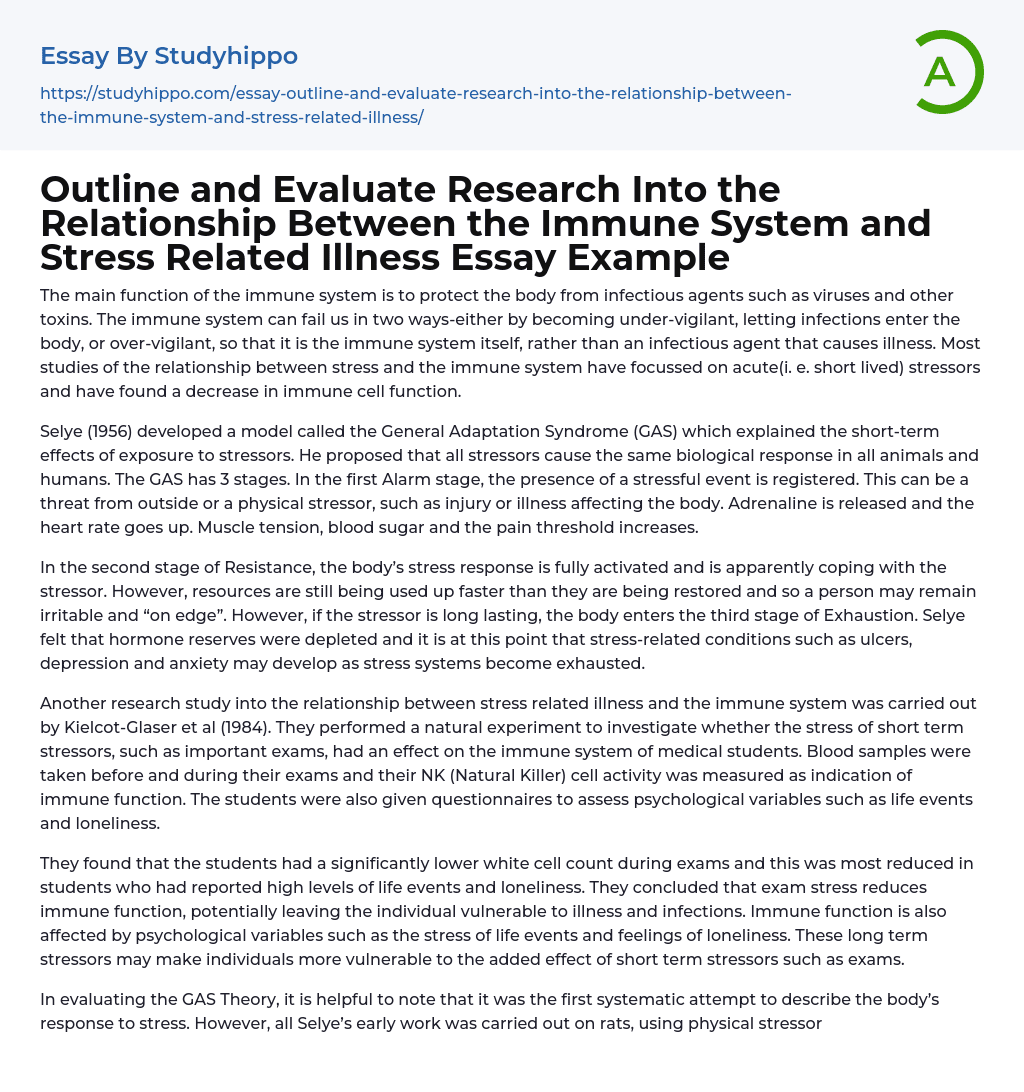

The Immune System: Protecting Us from Infection and Illness
Primarily, the immune system serves as a defensive barrier for our bodies against harmful invaders such as viruses and toxins. Nevertheless, its efficiency can decline if it becomes excessively relaxed, which could lead to infections, or overly aggressive, causing diseases instead of combating detrimental pathogens. Most research that investigates the link between stress and immune responses focuses mainly on acute (short-term) stressors and observes a decrease in immune cell activity.
In 1956, Selye introduced the General Adaptation Syndrome (GAS) model to display the immediate impacts of exposure to stressors. He suggested that all living creatures, including humans, demonstrate a constant physiological reaction to any form of stress. The GAS method involves three phases. The Alarm stage is the first phase which begins upon recognizing a stressful situation and could be initiated by external threat
...s or internal physical stressors such as sickness or injury affecting the body. Consequently, there's an increase in adrenaline release along with heart rate, muscle tension, blood sugar levels, and pain tolerance.
In the Resistance phase, the second stage, the body exhibits a strong response to stress and seems to effectively manage stressful circumstances. However, it depletes its resources quicker than they can be replenished, leading an individual to experience continuous tension and unease. If this state continues over an extended period of time, then it progresses towards another stage called Exhaustion- which is the third stage. Selye suggested that at this juncture, there's a reduction in hormone reserves that could trigger stress-related problems such as ulcers, despair and anxiety stemming from an overly burdened system.
In 1984, a study was conducted by Kielcot-Glaser and colleagues t
investigate the relationship between stress-induced illnesses and the immune system. They executed a natural experiment examining whether temporary stress factors such as major exams could have an impact on the immune function of medical students. The researchers collected blood samples from these students before and during their examinations, using NK (Natural Killer) cell activity as an indicator of immune performance. Additionally, they had the students complete questionnaires aimed at assessing psychological aspects like life events and feelings of isolation.
The researchers discovered that during examinations, the students had a noticeably decreased white cell count. This was especially pronounced in those who indicated experiencing a lot of life events and feelings of isolation. They deduced that the stress associated with exams decreases immune function, potentially making a person susceptible to diseases and infections. It was found that psychological factors such as life event-induced stress and sentiment of isolation also have impact on the immune function. These persistent stressors might make individuals more prone to the compounding effects of transient stressors such as exams.
When examining the GAS Theory, it's essential to acknowledge that this was the initial comprehensive attempt to illustrate how human beings respond to stress. Selye conducted his preliminary studies on rats, using physical factors as stress triggers. Considering the physiological differences between rats and humans, there are challenges in directly translating his research findings to humans. A frequent criticism of the GAS theory is its neglect for individual variations. It assumes a standard response to stress by all individuals which we now know isn't correct due to significant influences from aspects like personality and gender on people's reaction to stress.
justify">
Some individuals may exhibit Type A behaviour - known for its high competitiveness and lack of patience, reportedly leading to a heightened susceptibility to coronary heart disease (CHD). On the other hand, Type B personalities, identified by their lower levels of competitiveness and more relaxed and tolerant nature, tend to be less prone to CHD. Furthermore, people embodying the Hardy personality type, as outlined by Kobasa, are more robust against harmful stress effects due to their self-perception of being in command of their own lives instead of being directed by outside forces.
Other than viewing life challenges as stressors, they perceive them as problems that require overcoming. Selye once held the view that "exhaustion" happened when the continual release of stress hormones eventually depleted our reserves, leading to stress-induced illnesses. However, it's currently understood that even under extreme pressure, our hormone supplies are seldom exhausted. The research conducted by Kielcot-Glaser utilized exams as a natural stress source in a natural experiment, thus offering considerable ecological validity.
Even though the representation of students may not be all-encompassing, it's imperative to make general inferences with care. The research was largely correlational, which hampers the capability to establish definitive cause-and-effect associations. Determining a direct causal connection between stress-related afflictions and immune system responses is laden with difficulties. A multitude of elements like genetics and lifestyle decisions affect health. Moreover, health usually stays constant and alters slowly, making it difficult to assert that exposure to particular stressors has resulted in health alterations.
- Microbiology essays
- Bacteria essays
- Cell essays
- Enzyme essays
- Photosynthesis essays
- Plant essays
- Natural Selection essays
- Protein essays
- Viruses essays
- Cell Membrane essays
- Human essays
- Stem Cell essays
- Breeding essays
- Biotechnology essays
- Cystic Fibrosis essays
- Tree essays
- Seed essays
- Coronavirus essays
- Zika Virus essays
- Anatomy and Physiology essays
- Addiction essays
- Biodegradation essays
- Dental Care essays
- Disease essays
- Disorders essays
- Health Care essays
- Intelligence Quotient essays
- Nutrition essays
- Olfaction essays
- Public Health essays
- Women's Health essays
- World health organization essays
- Cancer essays
- Infectious Disease essays
- Lung Cancer essays
- Neurology essays
- Physical Exercise essays
- Medicine essays
- Sex essays
- Inquiry essays
- Disability essays
- Poison essays
- Action Potential essays
- Nervous System essays
- Childbirth essays
- Puberty essays
- Blood essays
- Kidney essays
- Neuron essays
- Body essays


Unfortunately copying the content is not possible
Tell us your email address and we’ll send this sample there.
By continuing, you agree to our Terms and Conditions.

